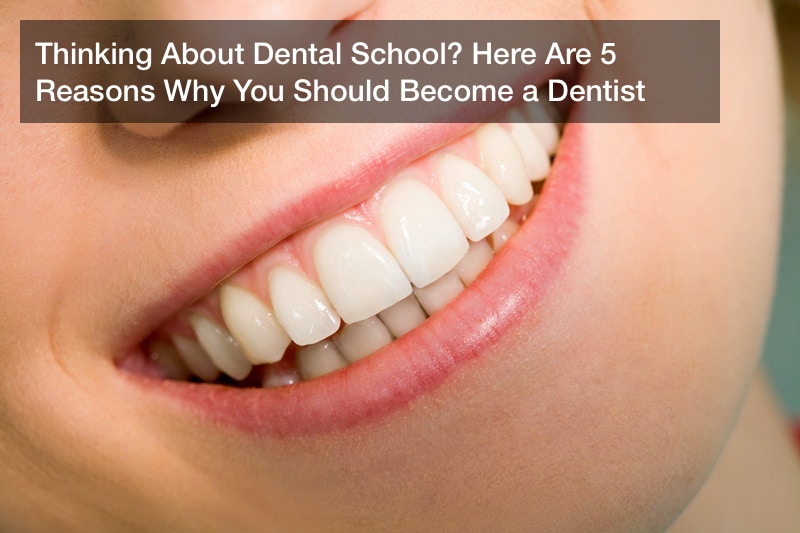
Dentists are doctors who diagnose and treat the teeth and gums. They promote preventive oral health practices and monitor the mouth, teeth, and jaws for future problems.
Full Answer
What education do dentists have?
The dentist is a doctor who is specially trained to care for teeth. When you visit for a checkup, your dentist will look at your teeth and gums to check for any problems. The dentist also wants to make sure your teeth are developing properly as you grow.
Are there any shortcuts to getting into dental school?
What level of education do dentists have? Dentists often have similar levels of education. 100% of dentists have a doctorate, with the second most common being no education at 0%. Level of education that dentists have. Education % of dentists; No education: 0%: High school diploma ...
How do you teach the importance of the dentist to students?
Introduction. (5 minutes) Ask the students to raise their hands if they have been to the dentist. Ask the class what happens at the dentist. Write their responses on the board either as a list or a flowchart. Explain to the class that today they will be learning about why the dentist is a very important helper in our community!
What is the typical dental school curriculum?
Dentists diagnose and treat issues with the mouth, teeth, and gums. They also provide training and advice on dental care in order to prevent future problems such as cavities and gum disease. Dentist may repair or remove broken teeth, take molds for dentures and other oral prosthetics, and deep clean scale and plaque from beneath the gum line.

What does a dentist do in simple terms?
The main responsibilities of dentists are to diagnose oral diseases and treat them with the help of different equipment and technologies. They manage to provide several services like tooth repair, cavities removal, teeth whitening, fillings, crowns, bridges, and even surgical procedures.
What do the dentists do?
What Dentists Do. Dentists remove tooth decay, fill cavities, and repair fractured teeth. Dentists diagnose and treat problems with patients' teeth, gums, and related parts of the mouth. They provide advice and instruction on taking care of the teeth and gums and on diet choices that affect oral health.
What are 5 things a dentist does?
5 Most Common Dental Procedures From a General DentistFillings. Dental fillings are used to treat teeth that have cavities or decay. ... Dental crowns. Dental crowns are used to repair teeth that have been badly damaged by decay or injury. ... Tooth extractions. ... Dental implants. ... Braces.
What are the education requirements to be a dentist?
Doctoral or professional degreeDentist / Entry level education
What is the full meaning of dentist?
Definition of dentist : one who is skilled in and licensed to practice the prevention, diagnosis, and treatment of diseases, injuries, and malformations of the teeth, jaws, and mouth and who makes and inserts false teeth.
Why going to dentist is important?
Regular dental visits are important because they allow your dentist to: Detect cavities (tooth decay) early. Your dentist examines your teeth to find cavities while they're still minor. The earlier you catch them, the less expensive cavities are to treat.
Where do dentists work?
Most dentists either work in private practices (primary care), dental hospitals or (secondary care) institutions (prisons, armed forces bases, etc.).
What are interesting facts about dentists?
Yes, dentists, you really are amazing!The first dentist was 5000 years ago! ... Dentistry is one of the top jobs in the US. ... Oral and maxillofacial surgeons are the best-paid dentists. ... There'll be 10,400 new dentists by 2028. ... 80% of dentists practice general dentistry. ... 80% of dentists go into private practice.More items...•
Is studying dentistry hard?
Dentistry is known to be a challenging qualification requiring the development and demonstration of expert knowledge, from terminology to procedures. The curriculum that you will follow at dental school will not be identical for all institutions, but there are some key commonalities.
Is dental school Hard?
Yes, dental school is really difficult. Most students struggle with a vast amount of studying. Dental school is an academically demanding course, applicants must demonstrate a wide range of capabilities – both theoretical and practical. One mistake on their part could lead to the patient suffering the consequences.
Is becoming a dentist worth it?
Top Job, Top Pay and Flexibility U.S. News & World Report ranks jobs yearly, and in 2021 dentistry came up as the No. 9 best job in the country and the No. 11 best paying career3. We have a high annual salary that keeps growing and an almost non-existent unemployment rate4.
What does a dentist do?
The dentist is a doctor who is specially trained to care for teeth. When you visit for a checkup, your dentist will look at your teeth and gums to check for any problems. The dentist also wants to make sure your teeth are developing properly as you grow.
What does a dental hygienist do?
During your visit, the dental hygienist will take X-rays, or pictures, of your teeth. X-rays are like superhuman vision. They can show cavities hiding between your teeth and problems beneath your gums. A cavity is a decayed, or rotted, part of a tooth.
What is the first person you meet at the dentist's office?
One of the first people you'll meet at the dentist's office is the dental hygienist (say: hi-JEH-nist). A dental hygienist is a person who knows all about keeping teeth and gums clean and healthy. The dental hygienist will look inside your mouth to make sure your teeth are growing properly and your gums are healthy.
What is the best way to clean your teeth?
The dental hygienist will brush your teeth with a special toothbrush and toothpaste. The toothbrush has a small, round tip that moves around and around to clean your teeth. The toothpaste might taste like your own toothpaste at home, but it will feel a little grittier — almost like sand.
What does a dentist do to check your teeth?
The dentist will look at all of your teeth and check your gums to make sure they're strong and healthy. The dentist will also check the way your top and bottom te eth work together. This is called your bite. If there might be a problem with your bite, you may be referred to an orthodontist (say: or-tho-DON-tist).
What do dental hygienists use to clean teeth?
The dental hygienist will clean and polish your teeth, using tiny dental tools like a tooth scraper, mirror, and special toothbrush.
What is the best treatment for tooth cavities?
Next it's time for your fluoride (say: FLOOR-ide) treatment. Fluoride is a natural mineral that makes your teeth strong and helps prevent cavities. At the dentist's office, a fluoride gel or foam will be applied to your teeth. Most dental offices offer fluoride treatments with flavoring, like bubble gum or grape.
What do dentists study?
Most dentists have a doctorate. The most common areas of study are Dentistry, Biology, and Biochemistry .
How many dentists have a doctorate?
Dentists often have similar levels of education. 100% of dentists have a doctorate, with the second most common being no education at 0%.
What do students learn from dental school?
Students will be able to identify the job of a dentist and know how to keep their teeth healthy.
How to teach students about teeth?
Tell the class that it is very important to take care of our teeth, and the dentist helps us do this. Inform students that some foods make our teeth healthy and can some hurt our teeth. Place various healthy and unhealthy foods cutouts from magazines on a table. On the board, make two columns.
What do you give each student for a tooth?
Give each student a white laminated cutout of a tooth and a yellow dry erase marker.
What does regular brushing and flossing of teeth do?
Tell your students that regular brushing and flossing of teeth keeps them white, shiny, and, most importantly, healthy!
What does a dentist do?
Dentists diagnose and treat issues with the mouth, teeth, and gums. They also provide training and advice on dental care in order to prevent future problems such as cavities and gum disease. Dentist may repair or remove broken teeth, take molds for dentures and other oral prosthetics, and deep clean scale and plaque from beneath the gum line.
What is the most common career path for a dentist?
Although a private or partnership dental practice is the most common career path, dentists also find employment in other environments such as: State and county public health programs. Typically located in high population areas, these programs offer dental treatment to primarily low-income families.
How do dentists work?
The majority of dentists, by necessity, work in dedicated dental offices so they have access to the tools, equipment, and accessories needed to do their job. Most dentists work in one of three options: under contract from another dentist, as a partner with one or more other dentists, or in their own private practice. Each situation has pros and cons: 1 Under hire dentists have no overhead but have no decision-making input and a lower income level. 2 A partnership allows a dentist to only be responsible for a percentage of the overhead and they have a say in the way the business is run. Their income is much higher, but they must have a good working relationship with their partners. 3 An independent dentist will have income in direct proportion to their clientele and has full authority to make all decisions for the practice, but they will most likely work long hours and will have a high investment for equipment. A smaller percentage of dentists work for the government, in outpatient care clinics, and as teachers in dental schools.
Why does it take so long for a dentist to build a clientele?
Because a dentist relies on repeat business from their patients it may take several years to build a clientele . This, and the high equipment overhead, are the key factors determining whether a dentist is employed by another, enters a partnership, or opens their own practice.
How much does a pediatric dentist make?
Specialty areas may earn significantly more; pediatric dentists earn an average of $174,069 and a high range of $255,806 per year and the average income for an Orthodontist is $172,490 per year with a high range of $300,829. Again, the higher annual pay typically reflects those with 10 to 20 years experience in the field.
How much does a dentist make in 2017?
The median annual wages for general dentists in 2017 was $158,120.
What are the requirements for dental school?
Most dental schools have minimum grade point average (GPA) standards as well as course prerequisites so you should keep this in mind throughout your college years.
How many years of training do dentists need?
For example, dentists who wish to teach or conduct full-time research generally spend an additional two to five years in advanced dental training.
What is the job of a dentist?
A dentist trains to become a general practitioner or specialist of dental health, whose primary responsibilities include diagnosing and treating issues related to the teeth, mouth, and gums. The American Medical Association identifies more than 80 percent of dentists are general practitioners who provide a wide range of dental services.
How much does a dentist make?
In 2012, the Bureau of Labor Statistics (BLS) cites the median salary earned by a dentist was $149,310. Dental professionals who earned $187,200 or more within the field provided specialized services, including orthodontists who have advanced training in how to straighten teeth; and oral and maxillofacial surgeons, who operate on the mouth and jaw. From 2012 to 2022, the BLS cites the hiring of dentists is projected to increase by 16 percent, which is a faster rate than the average for all other occupations in the U.S.
What is the ASDA guide for dental students?
The American Student Dental Association offers the ASDA Guide for Predental Students, which overviews the dental school application process; Dental Admission Test (DAT) preparation; dental schools in the United States; career path options; as well as information regarding scholarships, loans, and financial aid.
What is an allied dental educator?
All allied dental educators are allied dental professionals themselves, and may choose to practice and teach at the same time. They are typically hired to work as full-time or part-time faculty where certificates and dental health-related degrees are offered, such as vocational schools, community colleges, and dental schools. In addition to providing classroom instruction, allied dental educators may also oversee students fulfilling their lab and clinical obligations.
What is the entry level in dentistry?
Entry-level jobs associated with dentistry require the completion of two or fewer years of education, and depending on a chosen program, qualifies a graduate to assume a position as a dental laboratory technician, dental assistant or dental hygienist.
How long does it take to become a dentist?
From learning how to repair a chipped tooth to treat swollen gums, it takes an average of 8 years of education for a dentist to receive the knowledge, experience and training necessary to practice in the United States.
What are the requirements for dental school?
For students attending universities for an associates or bachelor’s in a dentistry-related fields, the common elements required for admission include standardized test scores, your high school transcript, letters of recommendation, and application essays.
What is a dental doctorate?
At the doctoral level, dentistry degrees include doctor of dental medicine (DDM) degrees as well as doctor of dental surgery (DDS) degrees. Both doctoral dentistry degrees follow a format similar to medical school. Two years of classroom-based instruction are followed by two years of hands-on clinical training.
How much does a dental hygienist make?
The average earnings for dental hygiene positions are presently over $71,000 a year. Finally, dentists are some of the most specialized job titles within the field of dentistry.
What are the most common dental jobs?
Some of the most common dentistry roles include: Dental Assistants. Dental Hygienists.
What degree do you need to become a dental hygienist?
At the bachelor’s level, students can pursue a number of degrees related to dentistry.
What is the second level of dental hygiene?
A second common associates-level degree in dentistry is that of associate of applied science in dental hygiene. This degree type typically requires three years for completion and can lead to jobs as a dental hygienist.
What is the role of dental support workers?
With all that said, dentists and other dental support workers play a critical role in functioning medical system. They are employed in a wind range of medical settings, from solo practices to large hospital systems and in government organizations. Dentistry careers can provide amazing career prospects, standard of living, and purpose.
How long is the dental school course?
Course duration: 20 hours over 2.5 days (Offered in spring, summer, and fall) Course fee: $595.00. What’s covered in the course: This is a university-based dental school preparation course. Students attend lectures and perform dental procedures as one would in dental school.
What is covered in the course on waxing maxillary incisors?
What’s covered in the course: Hands on experiences in waxing maxillary incisors, taking diagnostic impressions, fabricating casts, creating custom mouthguards, and drilling a cavity preparation followed by a composite filling.
What is the SHPEP program?
What’s covered in the course: SHPEP program engages 60 scholars from across the country in Science Academic Enrichment; Medical, Nursing, Dental and Pharmacy Career Development; Personal Development; Health Equity and Health Policy; Learning Skills Orientation; Written & Oral Communication Development; Clinical Experience; and Financial Planning Orientation. The goal of SHPEP is to support the academic and career development of underrepresented/ underserved, and/or rural, and/or disadvantaged students in the health professions. Application material and program details are available at the SHPEP website. (www.shpep.org)
What is covered in the course of typodont?
What’s covered in the course: Make typodont impressions and pour them in stone; use high-speed dental handpiece and other dental instruments; Prepare cavity restorations; Mill a CAD CAM porcelain restoration with E4D; Model a central incisor in wax; Participate in dental specialty boot camp; Meet the Director of Admissions.
